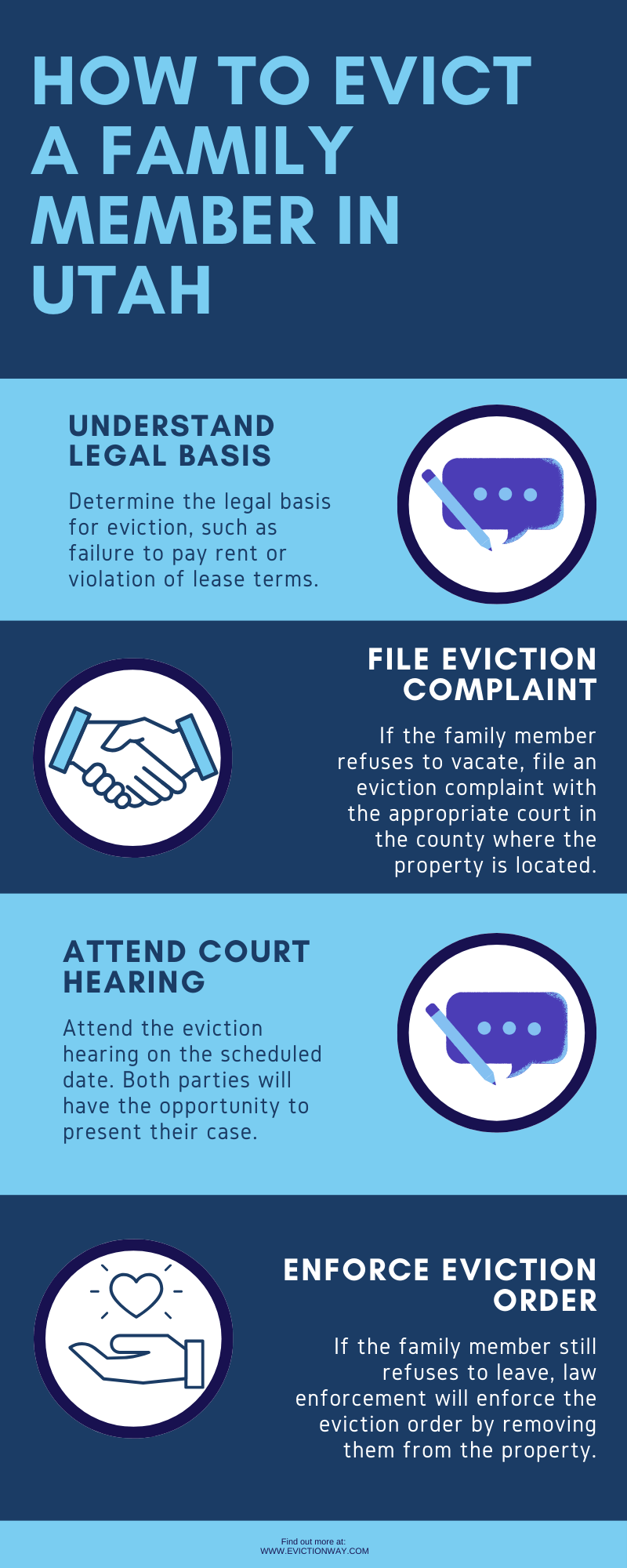Are you facing the difficult situation of needing to evict a family member from your Utah property? If so, you’re not alone. Many people find themselves in this position, and it can be a stressful and emotional experience.
In this blog post, we’ll provide you with a step-by-step guide on how to evict a family member in Utah. We’ll cover everything you need to know, from the legal process to tips on how to do it as politely as possible.

First, it’s important to understand the legal process for evicting a family member in Utah. The process can be complex, so it’s important to follow the steps carefully. We’ll provide you with a detailed overview of the process, including the forms you need to file and the deadlines you need to meet.
How To Evict a Family Member In Utah
Evicting a family member can be a difficult and emotional process. However, it is important to remember that you have the right to protect your property and your family. If you are considering evicting a family member, it is important to follow the proper legal procedures.
1. Give Notice
The first step in evicting a family member is to give them written notice. The notice must state the reason for the eviction and the date by which they must vacate the property. The notice must be served in person or by certified mail.
2. File a Complaint
If the family member does not vacate the property by the date specified in the notice, you will need to file a complaint with the court. The complaint must state the facts of the case and the relief you are seeking.
3. Serve the Complaint
Once you have filed the complaint, you will need to serve it on the family member. The complaint can be served in person or by certified mail.
4. Attend the Hearing
After the complaint has been served, a hearing will be scheduled. At the hearing, you will have the opportunity to present your case to the judge. The family member will also have the opportunity to present their case.
5. The Judge’s Decision
After hearing both sides of the case, the judge will make a decision. The judge may order the family member to vacate the property or may dismiss the case.
6. Enforcement of the Order
If the judge orders the family member to vacate the property, you will need to obtain a writ of possession from the court. The writ of possession will authorize the sheriff to remove the family member from the property.

Additional Resources for Utah eviction help:
15 day eviction notice Utah
In Utah, a 15-day notice to quit for non-payment of rent is a document used by landlords to inform tenants they’ve missed rent. It gives the tenant 15 days from the date they receive the notice to do one of two things:
- Pay the rent in full
- Vacate the property
If the tenant doesn’t comply within the 15 days, the landlord can then proceed with filing an eviction lawsuit in court.
You can download 15 day eviction notice Utah here.
How Much Does it Cost to Evict a Family Member in Utah?
Evicting a family member can be a difficult and expensive process. The cost of eviction will vary depending on the specific circumstances of the case.
In addition to the court costs, you will also need to pay for the services of a process server and a locksmith. If the eviction is contested, you may also need to pay for the services of an attorney.
| Expense | Approximate Cost | Notes |
|---|---|---|
| Court Filing Fee | $150 – $360 | Varies by court location and amount of rent claimed due |
| Service of Process | $50 – $100 | Cost to have the eviction notice served by a constable or sheriff |
| Attorney’s Fees | $500 – $2,000+ | Based on complexity of case and attorney rates |
| Set-Out Costs | $100 – $400 | If the sheriff must remove belongings after eviction |
| Loss of Rent | Varies | While the eviction process is ongoing |
- Here is a breakdown of the estimated costs of evicting a family member in Utah:
- Filing fee: $150
- Service of process: $50-$100
- Locksmith: $100-$200
- Attorney fees: $500-$2,000 (if the eviction is contested)

FAQs: Evicting a Family Member in Utah
Here are some of the most asked questions.
What are the grounds for evicting a family member in Utah?
In Utah, you can evict a family member if they have violated the terms of their tenancy, such as not paying rent or breaking the lease. You can also evict a family member if they are causing a nuisance or disturbing the peace of other tenants.
What is the process for evicting a family member in Utah?
The process for evicting a family member in Utah is similar to the process for evicting any other tenant. You must first give the family member a written notice to vacate the premises. The notice must state the reason for the eviction and the date by which the family member must vacate. If the family member does not vacate the premises by the deadline, you can file an eviction lawsuit with the court.
What are the defenses to eviction in Utah?
There are several defenses to eviction in Utah, including:
- The family member is a minor child.
- The family member is disabled.
- The family member is a victim of domestic violence.
- The eviction is retaliatory.

What are the consequences of evicting a family member in Utah?
Evicting a family member can have serious consequences, both for the family member and for you. The family member may lose their home and their belongings. They may also have difficulty finding a new place to live. You may also face legal liability if the eviction is not handled properly.
What are some tips for evicting a family member in Utah?
Here are some tips for evicting a family member in Utah:
- Document everything: Keep a record of all communications with the family member, including any notices to vacate and any attempts to resolve the issue.
- Be fair and reasonable: Give the family member a reasonable amount of time to vacate the premises and try to work with them to find a solution that works for both of you.
- Get legal help if necessary: If you are unable to resolve the issue on your own, you may need to seek legal help.
Related:
